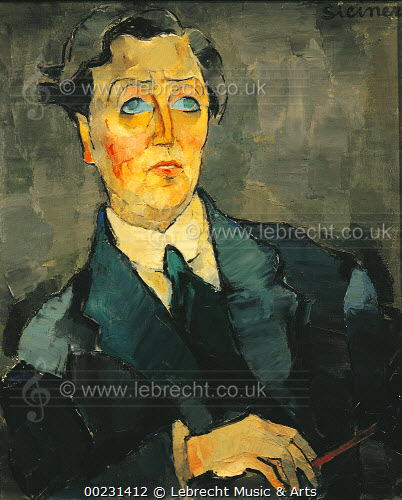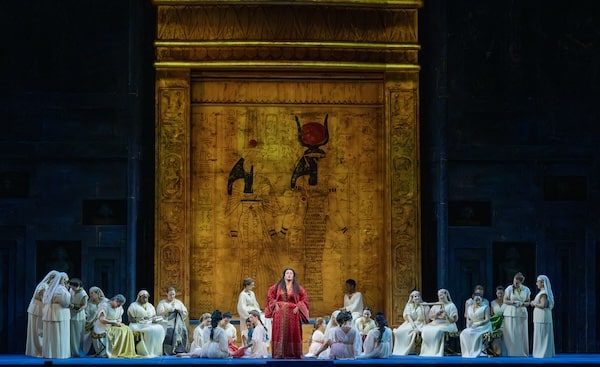Did Alban Berg flirt with Nazism in his violin concerto?
mainThe Berg researcher Douglas Jarman has come up with disturbing evidence that Alban Berg toyed with a slogan from a banned rightwing organisation as a structural theme for his valedictory masterpiece.
The concerto is dedicated to the memory of Alma Mahler’s daughter, Manon, but there were other influences at work and Berg was keen in 1935 to ease the ban on his music in Nazi Germany.
Read Jarman’s important and revealing essay here.






Truly fascinating, but I’d prefer not to be the first commenter on this particular discussion, so I’ll wait…
That’s a rather fanciful theory. Alban Berg could not be so naive as to believe that his music would be accepted by the Nazi authorities. “Aryan” yes, but his music was still “atonal noise”.
Yes indeed pff, the author went to a great deal of trouble before ultimately coming to that same conclusion himself. It is however a very interesting read, that guy has done some amazing research and it made me want to listen again to that concerto. Good piece.
I have nothing but great admiration for Isaac Stern’s recording of this sublime and fascinating work. Whatever Berg’s musico-political decision, he could not have foreseen then Hitler’s ultimate plan for Berg’s own people.
Ungeheuer, there is no way known that he had Nazi sympathies- as if he somehow thought the Nazis would go to the trouble of somehow decoding the work, and the author himself eventually reaches that same conclusion. Webern on the other hand…
Oh and by the way, Joseph Szigeti for me.
“…ultimate plan for Berg’s own people”? Alban Maria Johannes Berg was not himself Jewish.
I assumed our esteemed Ungeheuer was referring to the Austrian people…
That’s exactly what I meant but, written in haste, I can see how it could be understood to mean Jews.
==Hitler’s ultimate plan for Berg’s own people
I don’t believe Berg was Jewish
Hitler meant: the composers who adapted the 12-tone system without orthodoxy.
I do not consider it “disturbing evidence that…” for the simple reason that I wholly agree with Jarman’s point toward the end of the article that a) the way Berg seemingly employed the slogan would not in a month of Sundays have made it evident to the Nazis or, generally, anyone not intimately acquainted with the development of the work, that it was in there. He didn’t use the theme (a bit tricky in a work based on a twelve-note row and its inversion), and in any case he reversed the words, which were not clearly disclosed to begin with. Also, in any way embedding the song in the concerto would have done nothing to get Berg’s works played. Jarman’s argument that it was, in fact, a gesture of defiance seems vastly more likely.
I recall that not long ago there was a bit of a palaver over suggestions that Webern was a Nazi sympathizer. Do tell us, I thought, in what ways. My own teacher was Webern’s last pupil, a Polish Jew who, after the other seven pupils had left, stayed in Vienna living with Webern and his family until the day after Kristallnacht. A stubborn man and a touch eccentric. There is no hint of any sympathizing, compliance and so on in Moldenhauer’s massive chronicle of Webern’s life and work, nothing if not exhaustive. Some of Webern’s children were pro-Nazi, but Webern imposed a rule that politics were not to be discussed in the family home, reminding of a friend of mine who told his son he could visit, but would leave his obnoxious political and social views on the front porch. Schoenberg was annoyed that Webern did not speak out, but his correspondence with my teacher after the War suggests a frantic wish to find out just what happened to Webern. Yes, Webern did not speak out, but if we start going down that road…. That and this Berg business seem to me to edge toward the casuistic or, if one prefers, the pilpul as excessively ingenious disquisition. Jarman’s piece I welcome, though, for his conclusions I think sound and he may have forestalled less scrupulous and scholarly authors who might somehow latch onto Berg’s FFFF notion. That may keep them occupied bashing Furtwangler and scrupulously ignoring the Nazism of Karl Bohm. And that I am really am sick and tired of.
Steven, you are surely as capable of tracking down a wikipedia page as any of us, there is plenty of cited anecdotal (all there is ever likely to be) evidence there of Webern expressing Nazi sympathies, make of it what you will. You’re bang on the money re Furtwängler v Böhm, and wasn’t there another extremely well know conductor at the time who somehow got away with joining the party twice?- the first time when it was actually illegal to do so in Austria. That can hardly be shrugged off as a mere career move.
David, I am, although but a doddery old retired historian, capable of checking Wikipedia, but that is not exactly a prime source for me. Nor is anecdotal evidence. What I heard from my Polish-Jewish teacher is rather more important to me, listened to as Webern gazed toward us from the wall. So also Schoenberg’s letters to both him and to Webern. And Oskar Kokoschka, who adopted said teacher as a protege after he managed to get to London. Research historians like primary evidence, and conversations with the participants in events or the letters of such, is primary evidence, though it is our task to first consider the nature and role played by the horse from whose mouth the information/views is coming. I’m hard put to think the three figures I’ve mentioned here (there are others, of course) were fudging or lying. Re secondary sources on this, I mentioned Moldenhauer. Painter’s work, cited below by John Borstlap, I think unsound, especially in its use of evidence. All such works, having had to wrench my life from a musical path as a conductor after a medical catastrophe and so spending decades as an academic historian, I reflexively view from the perspective of the latter. How evidence is evaluated and what arguments are then constructed upon it is the essence of merit and value.
I’m glad we agree on Furtwangler and Bohm. I didn’t go on to mention Karajan, too obvious, but I might have mentioned Clemens Krauss, Hans Knappertsbusch, but if I had mentioned more than those first two, I’d have felt bound to go on — and on and on, especially if I then moved from conductors to instrumentalists to singers. That’s the stuff of other books that have, of course, been written.
Thanks Steven, the most common source citing Webern’s alleged Nazi sympathies are a series of letters to Joseph Hueber. Now, whether Alex Ross, John Borstlap or anyone else has actually read these letters, or if they still exist, of that I am not certain. I’ve never seen them quoted. Hueber was supposedly an enthusiastic supporter of the regime, so perhaps Webern was just concerned for his own safety, or hoping to shore up his career in uncertain times, just being naive? Can hardly blame him for any of these really. Given where the world is at the moment, we could all be on our way to finding out what it was like.
I endorse your comment, David — especially that last sentence! I have seen Hueber quoted in the Moldenhauer’s 800-plus pages, but that had neither jot nor tittle to do with Nazism. I wonder if the Hueber correspondence is the Molderhauer Archive? I have not seen those letters, and references to them sans quotations, and full ones, go nowhere with me. I should also at one time (I got a bit exhausted with this business, for numerous people have thought I’m a possible source) have liked to see the substantial correspondence with the Jewish singer Greta Wilhelm, whom Webern’s hiring got him into trouble, and who later assisted Webern as his fortunes declined. I’ve seen no references to those, but then a lot of cherry-picking goes on in this area. My intense dislike of the OTT statements of the likes of Alex Ross and Richard Taruskin (the latter a cherry-picker par excellence and a lousy historian of music) is that they at once conjure up an image of one who would have rejoiced at news of the holocaust. We DO know that Webern sheltered a number of Jews — I had one of them having a go at me if I mucked up a Bach partita or a tone-row. His disgust at German anti-Semitism in general is clear early on in letters to Schoenberg and others. And here your point comes in. What I’ll call for convenience the structure of Nazi Germany allowed far more wiggle-room than did that of the Soviet Union, by far. People did wiggle just to survive, and by the end of the 30s Webern was utterly destitute. There was no uncertainty about this — he had no income. And he had no career to shore up. So if he did, in fact, wiggle a bit at that point, we might try to imagine ourselves in the shoes of many in Nazi Germany — though not Bohm, Karajan, et al.! Schoenberg did so in a letter that did not mention Webern, but made a general comment about the Nazi years not dividing “us”: himself and his close friends and colleagues. He did try to pin down Webern’s position re Nazism, but he was not given to ambivalent positions, and I think the tone of his letters to my teacher and others as he tried to find out just Webern came to be shot dead says a lot. My thanks.
From Karen Painter.s extensive research: ‘Symphonic Aspirations, German Music and Politics 1900-1945 (Harvard University Press 2007) it obviously transpires that Webern had full sympathy for the nazis, the consequences of which he did not fully understand, but he applauded the ideology right through WW II and never wavered. He considered his own music the perfect new music for the nazi regime and was really perplexed that they did not see the point. Both forms of thinking had at its centre a top-down organisational idea in which the individual element did not count, an inhuman approach, entirely artificial. It is understandable that Webern recognized the same mental framework and the relationship between (national-)social engeneering and the serial system.
As did Stravinsky who had no qualms about conducting in Nazi Germany, proudly declared his Aryan-ness and also wrote fawning letters to Mussolini as revealed in Harvey Sachs’ Music in Fascist Italy. But the Musically Correct (MC, the musical equivalent of PC) professors who champion the then 20th century avant garde, sweep it under the rug while happily piling on Richard Strauss.
Agreed. They needed a scapegoat, so Strauss got the burden, and they brushed Webern, Stravinsky, Hindemith (who was enthusiastic about the nazis and only changed his mind when they rejected him), Adorno in the beginning, etc. etc. The first people who ran the Darmstadt Course after the war were change-coat nazis who had not much difficulty travelling from one topdown world view into the next. (Only after a couple of years they were kicked-out to be exchanged for less conspicuous totalitarians but who cultivated a comparable mentality.)
Again, you repeat the same nonsense you wrote some months ago on a similar topic. Neither Hindemith nor Adorno were Nazi sympathizers. This is utterly ridiculous! And about Darmstadt: While one of the organizers, Wolfgang Steinecke, had obviously made a career with help of the Nazi regime, all of the other people involved in that institution, and especially those lecturers who teached there in the first years were either victims of the Nazi regime or strong opponents to Nazi ideology: Scherchen (who had rather strong sympathies for communism), Kolisch, Adorno, Varese, Leibowitz, Krenek, Dallapiccola etc. etc. Boulez and Stockhausen, to whom you always seem to referring to, belong to a different era, and certainly were no Nazi sympathizers either.
To SL:
Adorno invoked Goebbels’ ideas in his (Adorno’s ) recommendations of some choral music in 1934, obviously in sympathy with the regime which by that time had already shown its teeth. Hindemith strongly believed in the rejuvination of music life under nazi regime in the thirties before his work was rejected in Berlin, where it was planned to be premiered by Furtwänglier who tried to reverse the verdict. (Only then, Hindemith began scratching behind his ear and decided to be against the nazis.) Heinrich Strobel, post-1945 director of a radio station and thus responsible for spreading the gospel of postwar modernism in Germany, recommended Goebbels’ “steel-like romanticism” when reporting on the German Composers Festival in 1933, shortly after assuming the editorship of the new music journal, Melos. This happened after the former editor was ousted for “political unreliability”. Ströbel even remained editor after the journal was nazified and renamed Neues Musikblatt. Ironically, both Adorno and Ströbel sympathized with a political climate that eventually forced them both into emigration (Adorno, and Ströbel’s wife, were Jewish). Wolfgang Fortner and Hermann Heiss who were involved in the setting-up of the Darmstadt sommer courses, were both blacklisted by the Americans. Heiss had happily collaborated with the nazis by writing marches, and Fortner had specialized in ‘festive music’ for the Hitler Jugend. Fortner rapidly turned to 12-tone music after the war. Alongside Heiss and Fortner many of the composers whose music was played in the early Darmstadt days (1946 – ) were compromised: Degen, Pepping, DIstler, Höffer. (Source: ‘Music after Hitler, 1945-1955, Toby Thacker, Ashgate publ 2007).
In other words, the change from nazi horror to modernist avantgarde was not difficult and Darmstadt was, in fact, created by these types. That they made place for the Stockhausen and Boulez generation, does not mean a drastic breach, but a perfectly smooth transition. The new people were not directly compromised, so they could not be accused, but their work took on quite some elements from the original mentality.
In conclusion, there are not many who can claim to be totally free from this taint. Pfitzner, who cops it more than most, was one who refused to submit to the Nazi call-out for music to replace Mendelssohn’s in A Midsummer Night’s Dream- Carl Orff and Werner Egk were two who had no such scruples.
None of this though should really bother any but the most sanctimonious amongst us. We could well be moving into similar, dangerous times so it’s probably a good idea not to be overly critical of those who did what they did to get by.
As a general rule however, “Reductio ad Hitlerum” has certainly been and still is a big part of the propaganda toolkit of all sides, but used particularly childlishly by the post war modernists. They can hardly complain when it comes back to bite them.
To SL: Thank you for writing what you have on this thread. You are right, of course. I’m not adding anything to the two comments posted above, for I’ve been through all this before, more than once, elsewhere, and discussion always winds up crossing the line into the boggling, the bizarre, and my suspicion of agendas at play. That is already apparent with bells on in this case.
The maxim “frisch, fromm, fröhlich, frei” was ubiquitiously used in German-speaking countries since almost twohundred years and makes for quite an imaginative musical program. Up to now I did not know of its temporary usurpation by a Nazi organisation and I do not think that this can prove that anyone using it was or is a Nazi. Furthermore using “mauscheln” and “Gott der Gerechte” etc. before the “Anschluss” in Austria cannot be considered proof of antisemitism. And in Switzerland which had no holocaust it is still not understood in this way. Even Freud collected jewish jokes.
The work was commissioned by violinist Louis Krasner who was definitely Jewish.
A footnote to Bill Ecker’s posting about Louis Krasner and the Berg violin concerto.
In 1994, near the end of his life, Louis Krasner recollected the circumstances of the third performance of Berg’s concerto. The first two had been in Spain and England.
The third was in April 1936 in Vienna with the Vienna Philharmonic and Klemperer conducting. The orchestra was very Nazified, moreso than the Berlin Philharmonic at that time. The orchestra members did not want to perform Berg’s unacceptable music, with a Jewish soloist and a conductor of Jewish descent.
When they protested to Klemperer, he said he would not change the program. And if the orchestra refused to play the concert, he would never conduct again in Vienna.
Arnold Rosé, the venerable concertmaster who was Jewish, said he would play the concert and the performance took place.
As soon as the concerto was over, the orchestra members immediately exited the stage, leaving only Krasner, Klemperer, and Rosé.
In Krasner’s words: “There were just the three of us there, all alone. Nonetheless, there was a vociferous affirmative response from the public.”
Read more at:
http://www.nytimes.com/1994/03/20/arts/classical-music-a-model-t-fuels-a-masterpiece.html
More here:
https://www.theguardian.com/music/2013/mar/11/vienna-philharmonic-nazi-secrets
Doesn’t it give a nice warm feeling to be at the morally right side of history and doesn’t the bashing of musicians who are either dead or retired give that cosy feeling of self-gratulating security? (While writing this, I see my PA clutching her pearls.)
its not about nazism. the missing link is Wedekind. read Frühlings Erwachen/Spring awakening (which was and still is his most infamous drama).